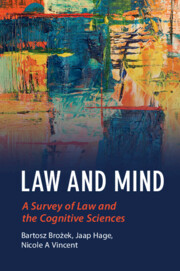Book contents
- Law and Mind
- Law and the Cognitive Sciences
- Law and Mind
- Copyright page
- Contents
- Figures
- Contributors
- Acknowledgements
- 1 Introduction
- I Metatheory and Methodology
- II Ontology and Epistemology
- III Legal Doctrine and Cognitive Sciences
- IV Evidence
- V Dissenting Opinions
- 22 A Non-Naturalist Account of Law’s Place in Reality
- 23 The Law and Cognitive Sciences Enterprise: A Few Analytic Notes
- 24 The Cognitive Approach in Legal Science and Practice: A History of Four Revolutions
- References
22 - A Non-Naturalist Account of Law’s Place in Reality
from V - Dissenting Opinions
Published online by Cambridge University Press: 21 April 2021
- Law and Mind
- Law and the Cognitive Sciences
- Law and Mind
- Copyright page
- Contents
- Figures
- Contributors
- Acknowledgements
- 1 Introduction
- I Metatheory and Methodology
- II Ontology and Epistemology
- III Legal Doctrine and Cognitive Sciences
- IV Evidence
- V Dissenting Opinions
- 22 A Non-Naturalist Account of Law’s Place in Reality
- 23 The Law and Cognitive Sciences Enterprise: A Few Analytic Notes
- 24 The Cognitive Approach in Legal Science and Practice: A History of Four Revolutions
- References
Summary
This chapter aims to outline the contours of a non-naturalist account of legal phenomena. Although it does not address the relevance of cognitive sciences to law specifically, the argument developed here aims to demonstrate that the said relevance depends on the antecedent question about the requirements of explanation of legal phenomena in terms of non-legal, more basic facts. By demonstrating the failure of naturalistic facts to meet the requirements of explanation, the chapter calls into question the relevance of cognitive science to law. In the first section I propose to understand naturalism in law as an explanatory claim about the (metaphysical) determinants of legal facts. Then I explore a family of objections against physicalism in the philosophy of mind (epistemic gap arguments) and argue that they apply equally to naturalistic explanations in the legal domain. But there is a key disanalogy between the two domains: while in the philosophy of mind explanatory gap arguments show that mental phenomena involve fundamental, non-physical facts, which are explanatorily basic, in the legal domain explanatory gap arguments show that the explanation of legal facts requires us to appeal to additional non-naturalistic facts which can bridge the gap of explanation between the legal facts and their non-legal determinants. I discuss briefly two versions of legal non-naturalism, and proceed to develop the one that is based on Kelsen’s account of legal cognition which, as it turns out, is surprisingly compatible with the ground-theoretic debates in contemporary metaphysics.
- Type
- Chapter
- Information
- Law and MindA Survey of Law and the Cognitive Sciences, pp. 473 - 489Publisher: Cambridge University PressPrint publication year: 2021



